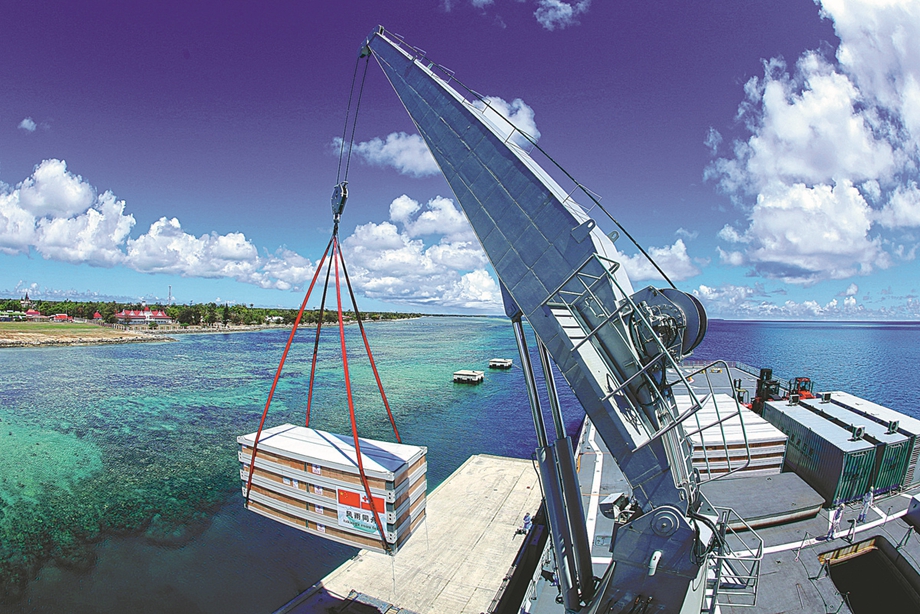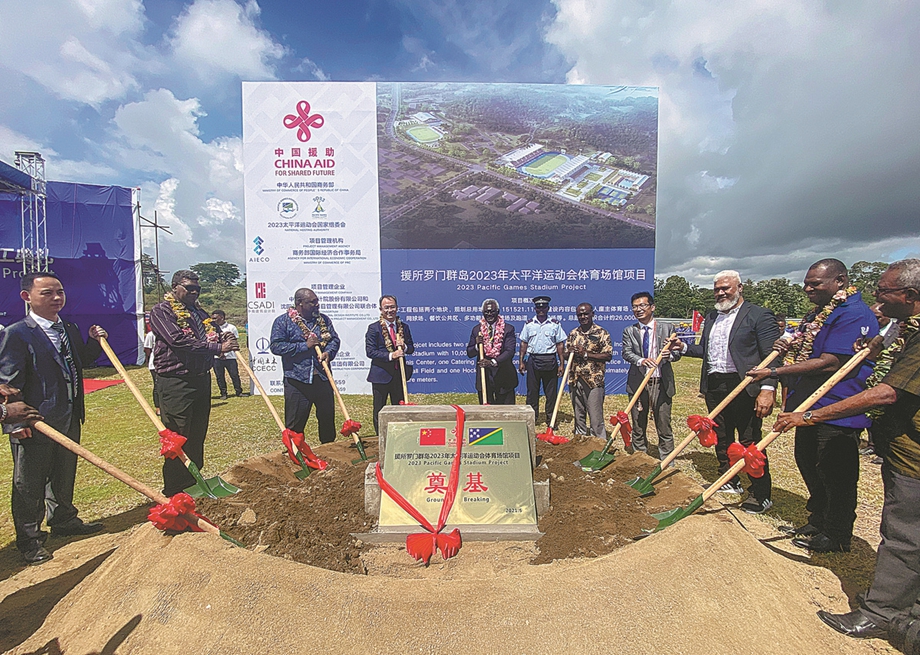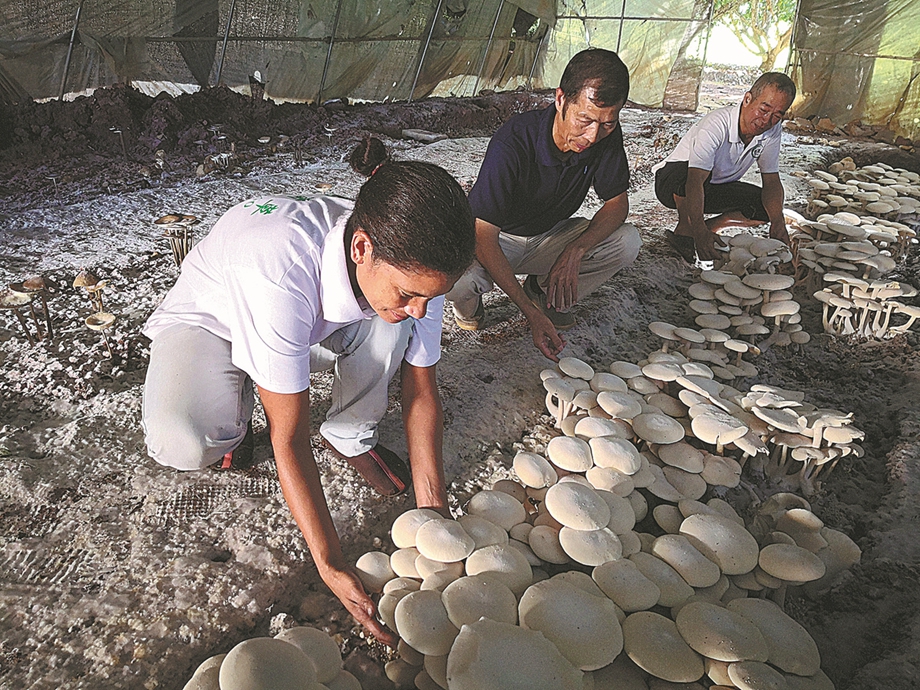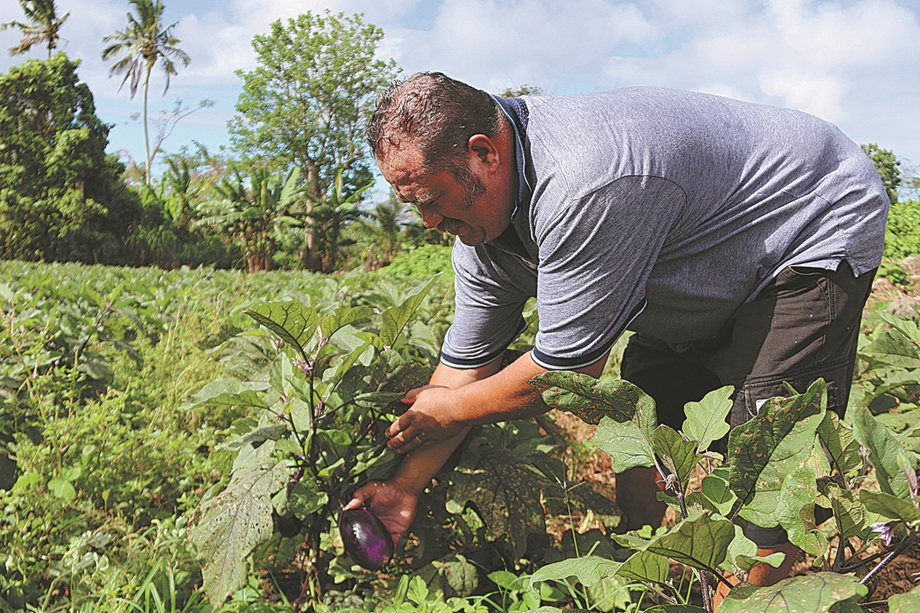China brings range of benefits to the Pacific
 Relief supplies are unloaded in Tonga from a Chinese naval vessel after the Pacific island nation was hit by a volcanic eruption and tsunami in January. XUE CHENGQING/XINHUA
Relief supplies are unloaded in Tonga from a Chinese naval vessel after the Pacific island nation was hit by a volcanic eruption and tsunami in January. XUE CHENGQING/XINHUA
Beijing's cooperation programs help countries advance
For Sunita Malo, stronger ties between China and Fiji provided an opportunity to give her family a higher standard of living.
In 2014, the 39-year-old farmer, who lives in Nadi, a city in the Pacific island nation, started to learn from a team of Chinese experts a technology known as Juncao, which is used to grow edible and medicinal mushrooms on an underlying layer of chopped grass.
Since then, Malo has developed such a high level of expertise in mushroom cultivation that she not only grows her own produce but also shares her knowledge with farmers at a vocational school.
"The Chinese experts gave us free training on planting mushrooms, and many farmers have started their own businesses to supply mushrooms to local markets," she said in an online interview.
The salary from the training sessions she gives at the vocational school means that Malo can now afford to pay the family's power and water bills. She has also bought a new television, freezer and daily necessities for her children.
Malo is just one of those to benefit from a wide range of cooperation programs between China and Fiji, with both nations stepping up joint efforts over the past decade to tackle urgent challenges and deliver more tangible benefits to their people. Other island nations in the Pacific have also benefited from such cooperation.
Trade between China and Pacific island nations, which dates to the 1970s, has flourished in recent years.
Total trade volume between China and such countries in the Pacific with which Beijing has diplomatic relations grew from $153 million in 1992 to $5.3 billion last year, registering an average annual rise of 13 percent and expanding more than 30 times in three decades.
Beijing has shared its expertise on infrastructure construction, agricultural development, health, poverty alleviation and response to the COVID-19 pandemic.
Jennifer Staats, director of East and Southeast Asia Programs at the United States Institute of Peace, said China can bring much-needed investment, infrastructure, trade and COVID-related assistance as Pacific island countries contend with a weakening global economy and try to recover from the many negative impacts of the pandemic.
A 10-day trip to eight nations in the South Pacific by State Councilor and Foreign Minister Wang Yi, which began on May 26, marked the latest high-profile diplomatic engagement between China and countries in the region. During the trip, Wang reaffirmed China's strong commitment to furthering friendship and pragmatic cooperation to the 10 Pacific island nations with which it has established diplomatic ties.
"China will forever be a reliable strategic partner for Pacific island nations on their path to rejuvenation and prosperity," he said after the trip.
Wang added that Beijing will seek to deepen pragmatic cooperation with the island nations, help them develop their economies, improve public well-being, and enable their people to share the benefits of China's growth.
On the visit, Wang met and held talks with the leaders of 17 Pacific island countries and with more than 30 ministerial officials. He also co-chaired the second China-Pacific Island Countries Foreign Ministers' Meeting with Fijian Prime Minister Frank Bainimarama.
Many key consensuses were reached on issues that included jointly responding to climate change, helping the island nations attain diversified growth, fighting COVID-19, disaster prevention and mitigation, medical and healthcare topics, and agricultural development.
Staats said in a research note that Wang's trip succeeded in strengthening many of China's direct state-to-state relationships across the Pacific, as evidenced by the signing of 52 bilateral agreements.
"At every opportunity, Wang stressed China's commitment to the Pacific islands region and Beijing's intent to remain engaged over the long term," she wrote, adding that Pacific island countries remain extremely open to stronger bilateral ties with China, especially in economic affairs.
 A foundation stone is laid to mark the start of China-aided construction of venues for the Pacific Games in Honiara, capital of the Solomon Islands, in May last year. XINHUA
A foundation stone is laid to mark the start of China-aided construction of venues for the Pacific Games in Honiara, capital of the Solomon Islands, in May last year. XINHUA
Political commitment
Ties between China and Pacific island nations reached new heights in 2014 and 2018, when President Xi Jinping visited the region. He held meetings with the leaders of these countries that have diplomatic ties with China, opening a new chapter in the history of such relations.
The strong emphasis placed by Xi on these ties was evident in written remarks he delivered to the second Foreign Ministers' Meeting on May 31.
He stressed that China will always be a good friend, brother and partner to Pacific island countries, sharing common goals and standing together with them despite changes in the international landscape.
China stands ready to work with these countries in order to proceed with confidence, build consensus and pool strength to build a community with a shared future, he added.
Pacific island leaders have embraced China's vision for stronger cooperation, saying they cherish their friendship and partnership with Beijing and look forward to furthering bilateral and multilateral pragmatic cooperation projects.
Henry Puna, secretary-general of the Pacific Islands Forum, said at the Foreign Ministers' Meeting that China continues to be a long-standing and important dialogue and development partner to the Blue Pacific region (the world's largest oceanic continent).
"As our Pacific borders reopen, and we adapt to life with COVID-19, we invite greater engagement with China to learn from and connect with your economic innovation and your education, trade and business development opportunities," he said.
Zhou Fangyin, a researcher of Chinese foreign policy at the Guangdong Institute for International Strategies, said Beijing has maintained the momentum of its cooperation with Pacific island countries despite the pandemic, and the collaboration on pandemic response and climate change mitigation has yielded strong results.
He said China is doing its best to help these nations respond to urgent challenges, including the pandemic, rising government deficits and debts, and natural disasters.
China was one of the first countries to respond after Tonga was hit by a volcanic eruption and tsunami in January. Two batches of relief supplies, including food, water, temporary shelters and beds, were sent to the Pacific nation from the China-Pacific Island Countries Reserve of Emergency Supplies in Guangzhou, capital of Guangdong province.
The reserve, proposed by Xi during phone conversations with Pacific island leaders last year, is part of broader efforts to help these countries improve their ability to cope with severe public health events and natural disasters.
The King of Tonga, Tupou VI, expressed strong appreciation for China's efforts to set up an emergency supplies reserve for Pacific island countries and to cooperate on poverty alleviation and climate change response.
He told Wang, the foreign minister, during a meeting on May 31 that when Tonga was confronted with the challenges posed by the eruption, the tsunami, disrupted flights and the pandemic, China came to its aid from thousands of kilometers away, winning widespread praise and heartfelt thanks from the Tongan people.
Lin Xiao, an official at the Guangzhou Municipal Government's Foreign Affairs Office, one of the agencies overseeing the reserve project, said the city authorities will explore more ways to share experience on disaster relief and emergency management with Pacific island countries.
She said the goal is to further help these nations strengthen their ability to respond to major public health emergencies and natural disasters.
 Chinese experts and local workers examine mushrooms produced from Juncao technology in Fiji. ZHANG YONGXING/XINHUA
Chinese experts and local workers examine mushrooms produced from Juncao technology in Fiji. ZHANG YONGXING/XINHUA
Tangible benefits
For many Pacific islanders, the Juncao technology has delivered the most tangible benefits.
In Fiji, Chinese experts have trained 1,704 locals on mushroom cultivation, including female farmers, people with disabilities, and even tour managers who lost their jobs due to the pandemic.
Lin Zhansen, head of the team of Chinese experts sent to Fiji, said the technology has been warmly welcomed locally, as it not only helps develop a low-cost mushroom cultivation industry, but also produces cattle feed and minimizes soil erosion.
"This project is low-cost, brings quick rewards and has benefited many ordinary Fijians," he said.
In Fiji, which used to import more than 120 metric tons of mushrooms annually, more than 600 farmers are now cultivating these crops, and Lin's team helped establish two model villages for this work in Fiji.
Malo, the farmer, said she gathered about 70 kilos of mushrooms in her first harvest, from which she earned about $800-a considerable amount in a country that in 2020 had a per capita GDP of $4,881.
She said she was excited to learn that China and Fiji had renewed the Juncao cooperation program during Wang's visit.
"This cooperation has brought concrete benefits to those involved and also economic growth for Fiji. It has given us the means to put food on the table and provide for our families," Malo added.
Luke Mani, director of the Solomon Islands Foreign Policy Advisory Secretariat, said people in Pacific island countries have benefited from hospitals, roads, wharves, schools, airports and sports facilities built by China.
"For instance, in the Solomon Islands, infrastructure donated and built by China has reached levels never previously seen," he said.
 A Samoan farmer checks eggplant grown on his land. ZHENG XIN/XINHUA
A Samoan farmer checks eggplant grown on his land. ZHENG XIN/XINHUA
Response to critics
Wang has addressed concerns from some countries over China's growing engagement with island nations in the Pacific. He said that Beijing has no intention of competing for influence or geopolitical gains in the South Pacific.
"For these countries, China is not a newcomer, but an old friend they have known for years," he said, adding that it has been nearly a decade since China established diplomatic ties with some Pacific island nations.
He added that Beijing respects the traditional bonds that Australia and New Zealand have with these nations, and is open to more tripartite cooperation with Canberra and Wellington.
Bainimarama, the Fijian prime minister, said on social media after a meeting with Wang, "The Pacific needs genuine partners, not superpowers that are super-focused on power."
He told reporters after the meeting, "Geopolitical point-scoring means less than little to anyone whose community is slipping beneath the rising seas, whose job is being lost to the pandemic, or whose family is impacted by the rapid rise in the price of commodities."
Mani, from the Solomon Islands, said, "This obsession with strategic interests is nauseating to many Pacific island nations.
"Seeing is believing. Local people, regardless of the attempts at misinformation and anti-China propaganda, are now believing in China as a reliable friend."